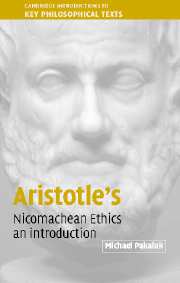Book contents
- Frontmatter
- Contents
- Preface
- 1 Reading Aristotle's Nicomachean Ethics
- 2 The goal of human life (Nicomachean Ethics, book 1)
- 3 Character-related virtue (Nicomachean Ethics 1.13 and book 2)
- 4 Actions as signs of character (Nicomachean Ethics 3.1–5)
- 5 Some particular character-related virtues (Nicomachean Ethics 3.6–4.9)
- 6 Justice as a character-related virtue (Nicomachean Ethics, book 5)
- 7 Thinking-related virtue (Nicomachean Ethics, book 6)
- 8 Akrasia, or failure of self-control (Nicomachean Ethics 7.1–10)
- 9 Friendship (Nicomachean Ethics, books 8 and 9)
- 10 Pleasure (Nicomachean Ethics 7.11–14 and 10.1–5)
- 11 Happiness (Nicomachean Ethics 10.6–9)
- References
- Index
1 - Reading Aristotle's Nicomachean Ethics
Published online by Cambridge University Press: 05 June 2012
- Frontmatter
- Contents
- Preface
- 1 Reading Aristotle's Nicomachean Ethics
- 2 The goal of human life (Nicomachean Ethics, book 1)
- 3 Character-related virtue (Nicomachean Ethics 1.13 and book 2)
- 4 Actions as signs of character (Nicomachean Ethics 3.1–5)
- 5 Some particular character-related virtues (Nicomachean Ethics 3.6–4.9)
- 6 Justice as a character-related virtue (Nicomachean Ethics, book 5)
- 7 Thinking-related virtue (Nicomachean Ethics, book 6)
- 8 Akrasia, or failure of self-control (Nicomachean Ethics 7.1–10)
- 9 Friendship (Nicomachean Ethics, books 8 and 9)
- 10 Pleasure (Nicomachean Ethics 7.11–14 and 10.1–5)
- 11 Happiness (Nicomachean Ethics 10.6–9)
- References
- Index
Summary
THE BASIC STRUCTURE OF THE NICOMACHEAN ETHICS
The Nicomachean Ethics, Aristotle tells us, is a search or an investigation (1.6.1096a12; b35; 1102a13). It poses a question at the start, looks at various possible answers along the way, and concludes with a definite judgment. The treatise therefore has something of the shape of a detective story.
What Aristotle tells us he is looking for, and what he wants us to join with him in looking for, is what he calls the “ultimate goal” of human life. Informally, we might think of this as what counts as “doing well” in life, or what it is for someone to be in the true sense “a success.” To attain our ultimate goal is to achieve “happiness.” Practically speaking, the ultimate goal in life is something toward which we would do well to direct everything else that we do. We reasonably prefer this to anything else. Our ultimate goal, we might think, is something we can rest satisfied in: when we attain it, we require nothing more.
Is there such a goal which is the same for all, and, if so, what is it? This is the basic question of the Ethics.
It is useful to think of any search as involving four basic elements. Suppose, for instance, that a detective wished to establish the identity of a person who committed a murder.
- Type
- Chapter
- Information
- Aristotle's Nicomachean EthicsAn Introduction, pp. 1 - 46Publisher: Cambridge University PressPrint publication year: 2005

